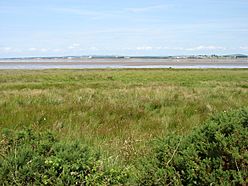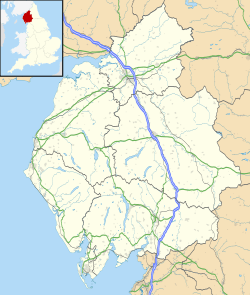Milefortlet 1 facts for kids
Quick facts for kids Milefortlet 1 |
|
|---|---|

View towards the Solway Firth near the site of Milefortlet 1
|
|
| Type | Milecastle |
| Place in the Roman world | |
| Province | Britannia |
| Location | |
| Coordinates | 54°56′43″N 3°14′14″W / 54.945407°N 3.237098°W |
| County | Cumbria |
| Country | England |
Milefortlet 1 (Biglands House) was a small fort built by the Romans in Britain. It was part of a long line of defenses along the Cumbrian coast. These defenses included small forts called milefortlets and stone watchtowers. They stretched from the end of Hadrian's Wall and were connected by a wooden fence. These coastal defenses were built around the same time as Hadrian's Wall itself. Today, you can still see the faint remains of Milefortlet 1 as a small bump in the ground.
What is Milefortlet 1?
Milefortlet 1 is located in a field next to Biglands House in Bowness. Pictures taken from the air show a square area about 50 meters wide. This area was once surrounded by ditches. On the ground, you can only see a small raised line that shows where the north and west sides used to be.
Digging Up the Past: Excavations
Archaeologists dug small test trenches at the milefortlet in 1954 and 1974. Then, in 1975, they fully excavated the site. Their digging showed that the fort was a rectangle, measuring 40 meters by 50 meters.
The first defense was a wall made of turf (grass and soil) that was 7 meters wide. Around this wall was a V-shaped ditch. The fort was built and rebuilt three times during its history. This means it was taken down and put back up again. Evidence suggests that the fort was used for most of the 2nd century AD.
Nearby Watchtowers
Each milefortlet had two watchtowers nearby. These towers were built in a similar way to the turrets found along Hadrian's Wall. The towers were placed about one-third and two-thirds of a Roman mile to the west of the milefortlet. Soldiers from the milefortlet would have likely guarded these towers.
The towers linked to Milefortlet 1 are called Tower 1A and Tower 1B. We don't know their exact locations for sure. There used to be a clear green mound where Tower 1A might have been. However, this mound was removed in the 1960s when its stones and gravel were used to build roads.
 | Valerie Thomas |
 | Frederick McKinley Jones |
 | George Edward Alcorn Jr. |
 | Thomas Mensah |


